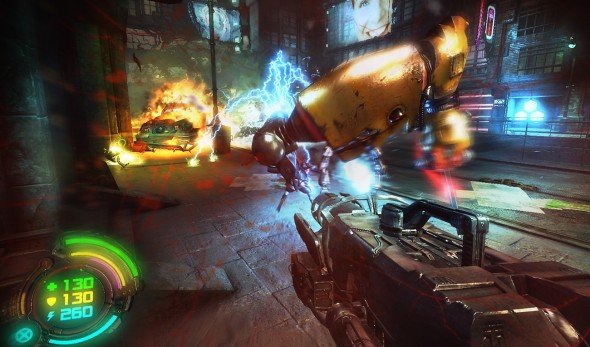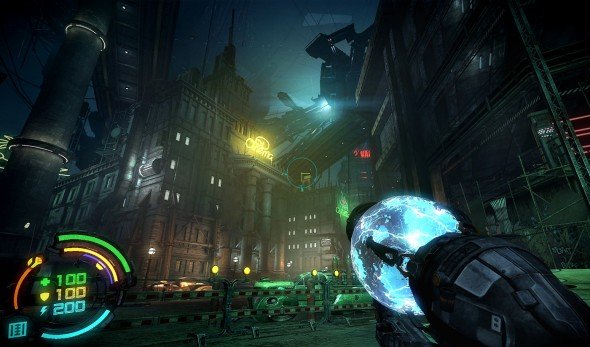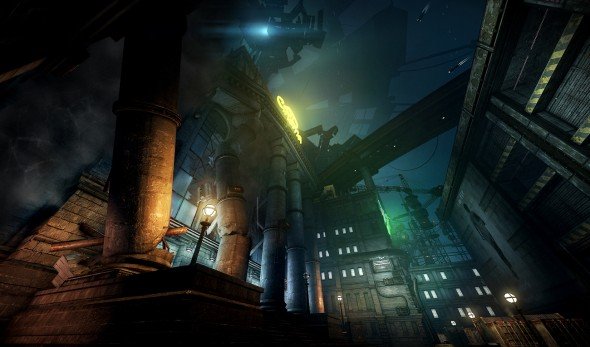Interview—Hard Reset dev on Call of Duty, cyberpunk, Deus Ex, PC exclusivity
In July, we blew the lid off Flying Wild Hog's cyberpunk-soaked love letter to shooters of yore, Hard Reset . But—after picking the lid shrapnel out of our charred flesh—we realized something: this isn't a typical game release. Big-budget PC exclusive? No multiplayer? Nothing about crying behind cover 70 percent of the time? We asked, and Flying Wild Hog founder Klaudiusz Zych answered. Read on for Zych's thoughts about Call of Duty, Deus Ex, phoned-in multiplayer, PC leaving consoles in the dust, and plenty more.
PC Gamer: What's Flying Wild Hog's background? How large is your team, and what games have inspired your current direction?
Klaudiusz Zych: Flying Wild Hog started up in April 2009. First it was 8 people, ex-employees of CD Projekt RED and People Can Fly. For the first year, we built our own engine from the ground up. Since then, the studio's grown to 35 people. Everybody in our team's a veteran dev with at least five years experience and multiple titles under their belt. There are people who previously worked in CD Projekt RED, People Can Fly, City Interactive and Metropolis. Some have over ten years of professional experience.

I won't hide that we were inspired by over-the-top, action-packed shooters, like Painkiller or Serious Sam. We wanted Hard Reset to have even more physics, destruction and mayhem with hordes of enemies. To do this, we had to make almost everything physical and destructible, even light sources. Hard Reset also adds an experience-based upgrade tree similar to something like Diablo. So it's basically a marriage of Painkiller and Diablo.
Hard Reset's a bit of an anomaly in a shooter landscape dominated by cover-heavy Call of Duty-alikes. Do you think gamers are getting fed up with that style of game? Do you think there's a growing contingent of folks who just want to shoot things with awesome weapons, "realism" be damned?
Zych: Hard Reset is a game that you want to jump on after work and unleash some mayhem. It's not an interactive movie on rails like most modern shooters. It's back to the roots of first person shooters, but with updated graphics. There are still many fans talking on forums about the old style of gameplay. They are fed up with modern games that just play themselves and don't require skill. Modern shooters are often lacking variety in game world theme selection. There is World War 2, modern warfare or Star Wars-like sci-fi. It's been quite some time since anyone picked the dark and dirty theme of cyberpunk, which is very interesting I think.

Similarly, you're not including a multiplayer component. Was that a tough decision for you? Do you feel like too many games tack on half-baked multiplayer modes without putting any thought into it—just to fill in a checkbox on some marketing survey?
Keep up to date with the most important stories and the best deals, as picked by the PC Gamer team.
Zych: Multiplayer is cool, so it was a tough decision. But it's either you make a heavily polished multiplayer-focused game to compete with Battlefield or Left 4 Dead 2 or don't make one. The idea to just add multiplayer mode to please publishers or marketing guys, or to put it on the box just doesn't make sense. We wanted to put the time we would spend on multiplayer to polish the single-player experience as much as we could.
You're going PC-only with this one, which is something of a rarity in the modern console-heavy triple-A space. Why'd you pick PC, specifically? Are you concerned at all about the typical PC woes: piracy, lack of exposure to "wider" audiences, etc?
Zych: It's been six years since the Xbox 360 was released, and console hardware has become an order of magnitude slower than current PCs. Multiplatform PC games need to make compromises about technology decisions and usually don't use the full potential of modern PCs. Of course, the console market has a larger audience, but PC gaming is still alive and well thanks to digital distribution channels and services like OnLive, so it can still be a great platform for smaller studios like Flying Wild Hog.
You've got a really nice cyberpunk vibe going with your game, but—like it or not—that puts you in Deus Ex: Human Revolution's line of fire. Obviously, you're making a very different sort of shooter, but is releasing in the same space as such a revered franchise a big thing for you? Is there any pressure there?
Zych: Deus Ex is a completely different kind of game. It's an RPG with heavy storyline, it is a slow-paced tactical shooter, while Hard Reset is an action game with lots of enemies storming at you and powerful guns to tear them into pieces. I think the only way that Hard Reset and Deus Ex are similar is the cyberpunk theme and art direction. We are not afraid to be compared here; it's easy for everyone to judge for themselves from screenshots and movies.

What sort of enemies will we be going up against in Hard Reset?
Zych: Expect hordes of biomechanical creatures storming at you in Hard Reset. In the world of Hard Reset, a rebellious AI is capable of building enemies from everything it can. Literally hundreds of randomly generated, differently appearing enemies will show up. And as I said, we were inspired by Painkiller, so expect BIG surprises.
You've opted to use your own technology instead of, say, the oh-so-trendy Unreal Engine 3. Why? Also, will Hard Reset include mod support at launch?
Zych: We wanted to tailor the Road Hog engine for the kind of game that we wanted to make. The idea was to have everything possible dynamic, so we are making extensive use of Havok physics. The graphics engine has fully dynamic lighting. We don't use pre-rendered lightmaps. Every light is dynamic; it can casts shadows or be shot down. It's just not possible with Unreal Engine 3 to run it smoothly on low-end PCs, as Road Hog does.
Another motivation to stick with our own tech is that we are a small company and we are pushing to have rapid code integration for tools and features that our artists and designers require. Our engine is clean and compact, so it's easy to experiment with things, add new functionality, etc. If community response to Hard Reset is positive, we might consider releasing an editor in the future.

